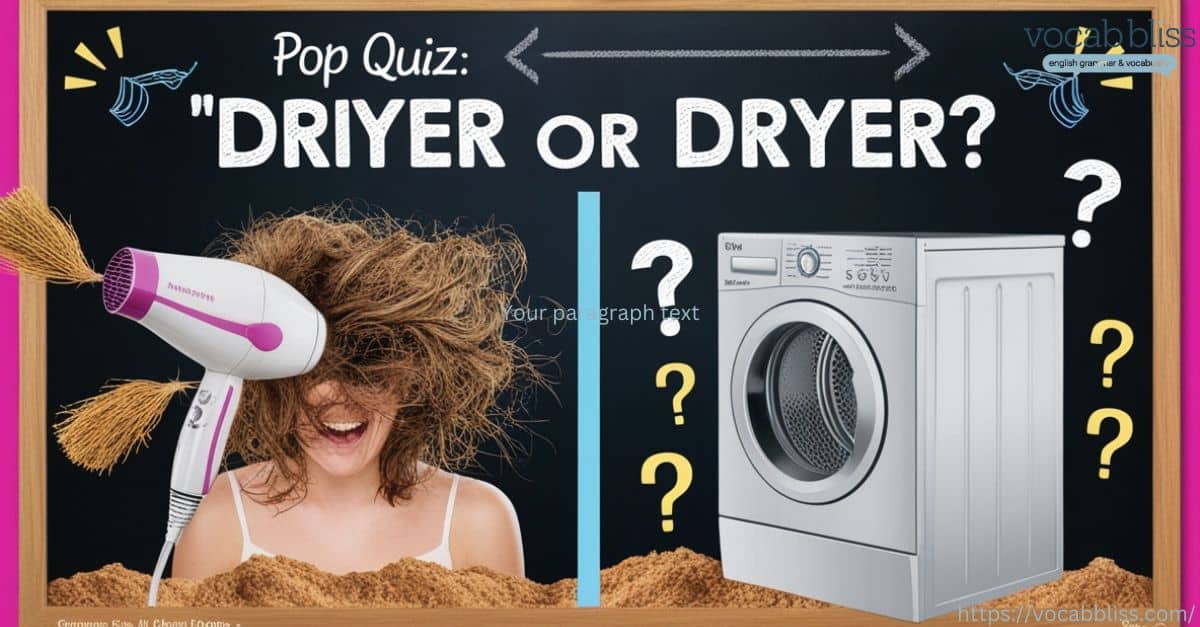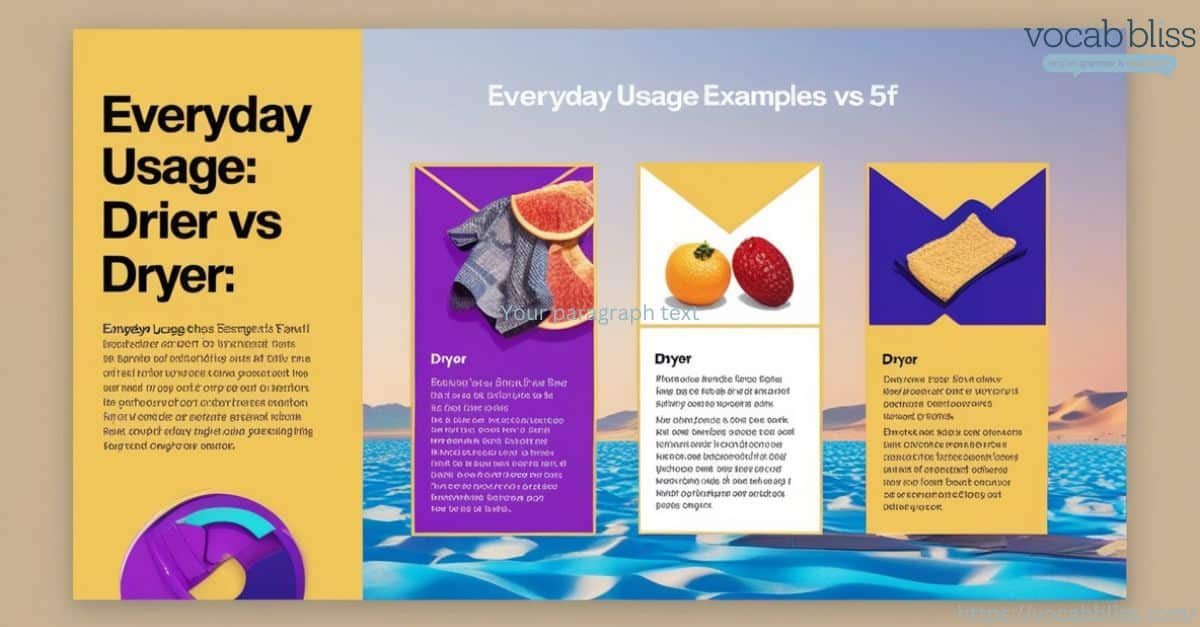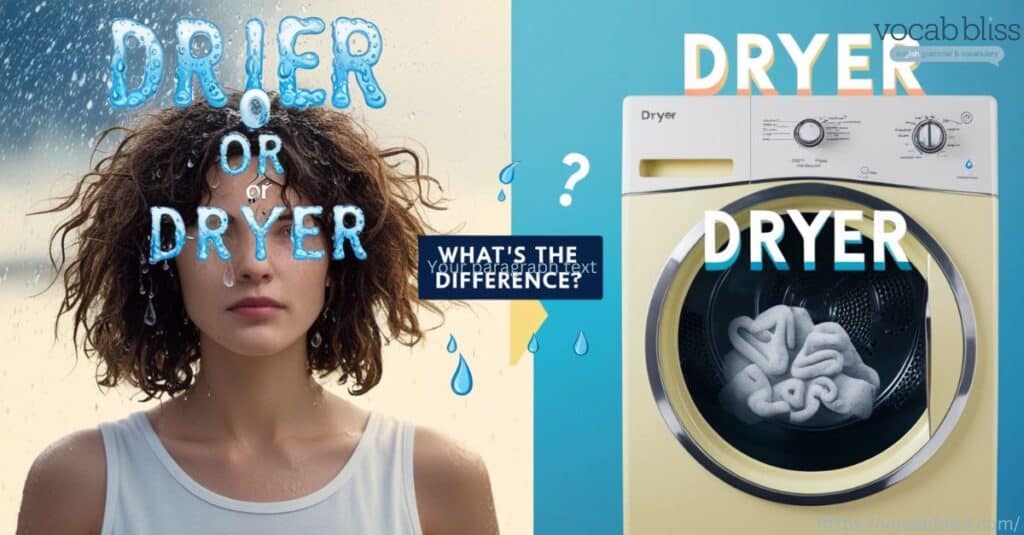English is filled with words that sound similar but have different meanings and uses, and “drier or dryer” are prime examples. Confusing these terms is common; however, understanding their distinctions can elevate your writing clarity. So, let’s break down these two words to explore their definitions, various contexts, and correct usage.
Quick Summary
Understanding the difference between “dryer or drier“ can prevent common mistakes in writing. “Dryer” is a noun that refers to a machine or appliance designed to remove moisture, such as a clothes dryer or hair dryer. On the other hand, “drier” is the comparative form of the adjective “dry,” used to describe something that has less moisture than another item or state. For example, “The air was drier in the desert than in the forest.” Knowing when to use each term helps make your writing clearer and more precise, ensuring you communicate your ideas effectively..
Read More: Hoodie or Hoody? Choosing the Right Spelling
Dryer: Definition, Meaning, and Usage
Definition and Origin
A dryer is a noun that refers to an appliance or device designed to remove moisture. The term has been used in English since the early 19th century, stemming from the verb “to dry,” which means to remove moisture or make something free of water.
Common Uses of “Dryer”
A “dryer” is specifically used to describe:
- Household appliances like clothes dryers and hair dryers.
- Industrial equipment for processes involving moisture removal.
Examples in Everyday Contexts
To see how “dryer” fits into a sentence, consider these examples:
- After washing the laundry, I placed it in the dryer to dry.
- The hair dryer I bought works perfectly for styling my hair.

The term “dryer” always refers to a tangible item that performs the act of drying.
Drier: Definition, Meaning, and Usage
Definition and Origin
On the other hand, drier is an adjective. It describes the comparative state of being “more dry” than something else.It comes directly from the adjective “dry”; therefore, “drier” functions as its comparative form.
Role in Grammar
“Drier” follows standard rules for forming comparatives in English. Like most adjectives ending in “y,” the “y” changes to “i” when adding the “-er” suffix.
Examples in Context
Here’s how “drier” appears in sentences:
- Today’s weather is much drier than yesterday’s.
- I prefer this cake recipe because it isn’t as drier as the other one I tried.
“Drier” is used when comparing moisture levels between two things or states, making it part of descriptive comparisons.
Pop Quiz

Put your knowledge to the test and decide which word drier or dryer fits best in these sentences. Now, let’s see if you’re ready to really ace this quiz! By the way, we’ll find out how well you can do as you move through each question. So, let’s get started!
- The air in the mountains felt noticeably [drier / dryer] than in the city.
- After washing my dog, I used a [drier / dryer] to help speed up the process.
- The forecast predicted [drier / dryer] conditions for the upcoming week.
- Does your apartment come with a washer and [drier / dryer]?
- Her sense of humor is even [drier / dryer] than her brother’s.
Pop Quiz Answers
Let’s see how well you did! Check the answers and learn why each choice is correct.
- Drier – The air in the mountains felt noticeably drier than in the city. (Drier is the comparative form of “dry.”)
- Dryer – After washing my dog, I used a dryer to help speed up the process. (Dryer refers to the appliance.)
- Drier – The forecast predicted drier conditions for the upcoming week. (Drier describes the comparative state of being less moist.)
- Dryer – Does your apartment come with a washer and dryer? (Dryer indicates the machine used for drying clothes.)
- Drier – Her sense of humor is even drier than her brother’s. (Drier describes humor that’s more subtle or understated.)
How did you do? If you got them all right, you’re well on your way to mastering these tricky words!
Strategies for Remembering the Difference
Simple Memory Tricks
- “Dryer” ends in “-er” like “washer,” so think of machines.
- “Drier” means “more dry,” just like “higher” means “more high.”
Quick Check Technique
If you’re unsure:
- Ask yourself: Am I talking about an appliance or comparing moisture levels?
Side-by-Side Comparison Chart dryer vs drier
Here’s a quick visual aid for remembering the difference:
| Word | Part of Speech | Definition | Example |
|---|---|---|---|
| Dryer | Noun | An appliance used to remove moisture | “The dryer broke down yesterday.” |
| Drier | Adjective | The comparative form of “dry” | “The air is drier today than yesterday.” |
Common Mistakes and How to Avoid Them
Typical Misuses
- Incorrect: This machine makes my clothes drier quickly.
- Correct: This machine is a dryer.
Guidance for Correcting
- Always double-check if you are referring to an appliance (use “dryer”) or a comparative state (use “drier”).
Everyday Usage Examples drier vs dryer

Dryer
- I bought a new energy-efficient dryer for my home. Additionally, it helps save on electricity bills, which makes it even more cost-effective in the long run.
- After a shower, I use a hair dryer to style my hair.
Drier
- This desert is much drier compared to the coast.
- I need a drier climate for my health issues, as the humidity makes my condition worse. Additionally, a less moist environment could improve my well-being.
Related Words and Their Usage
Understanding related terms can also help avoid confusion:
- Humidifier: Adds moisture to the air.
- Dehumidifier: Removes moisture from the air, similar in function to a dryer but for the air in a room.
Is It Drier or Dryer? Real-Life Scenarios
Imagine you’re chatting with a friend about a trip:
- You might say, “The climate was much drier in Arizona compared to Florida.”
- But if you’re talking about laundry, you’d say, “I need a new dryer; mine just broke.”
- The towel felt much drier after I left it in the sun for an hour; as a result, it was perfectly ready to use.
- I had to put the wet clothes in the dryer to speed up the drying process.
- After the storm, the air outside was noticeably drier.
- You can leave your shoes in the dryer to help them dry faster.
- The weather this week has been much drier than usual.
- I accidentally put my sweater in the dryer, and it shrank!

Conclusion drier or dryer
Dryer or drier might look similar, but their meanings are distinct. A dryer is a machine for drying things, while drier is an adjective that describes something as more dry. With these clear definitions, examples, and tricks, you can confidently choose between “dryer” and “drier” in your writing and conversations. Additionally, by practicing these tips, you’ll become more comfortable with their usage. As a result, you’ll avoid common mistakes and improve the clarity of your communication.
Expand Your Knowledge:
- Occasion or Ocassion: What’s the Correct Spelling?
- Long Term or Long-Term: Right Decision in Writing
- Cacoon or Cocoon: Which Spelling is Correct?
- Priviledge Or Privilege: What Is The Correct Spelling?

Jorge Phillips is an experienced blogger who writes for Vocab Bliss, sharing his passion for the English language. With a knack for simplifying complex grammar rules and a focus on commonly confused words, Jorge helps readers navigate the nuances of English with ease. His insights aim to make learning engaging and practical.







